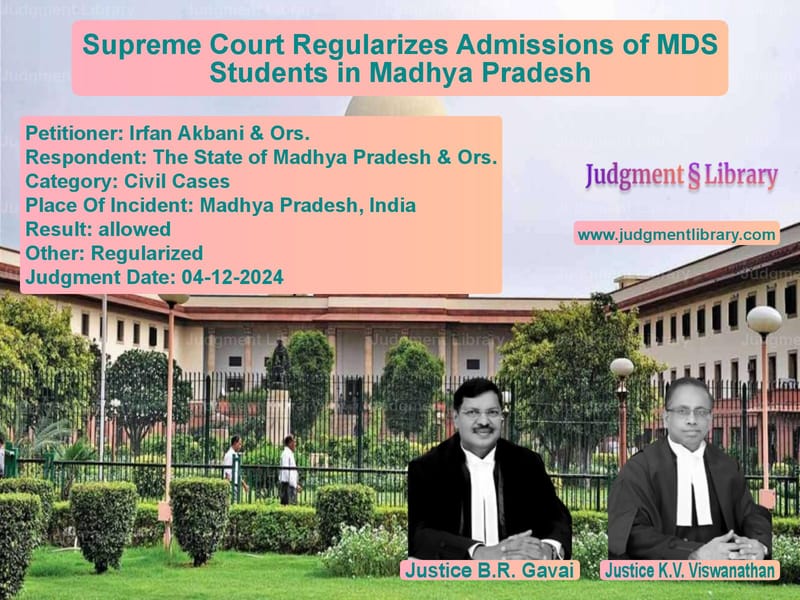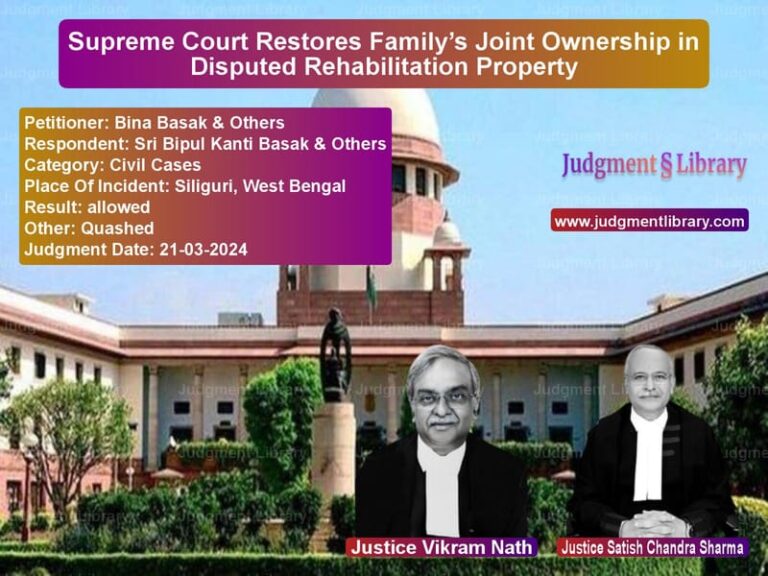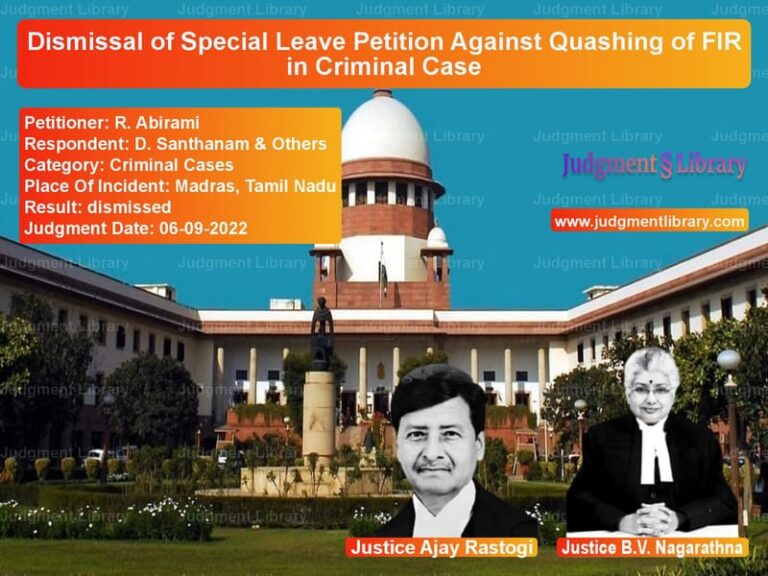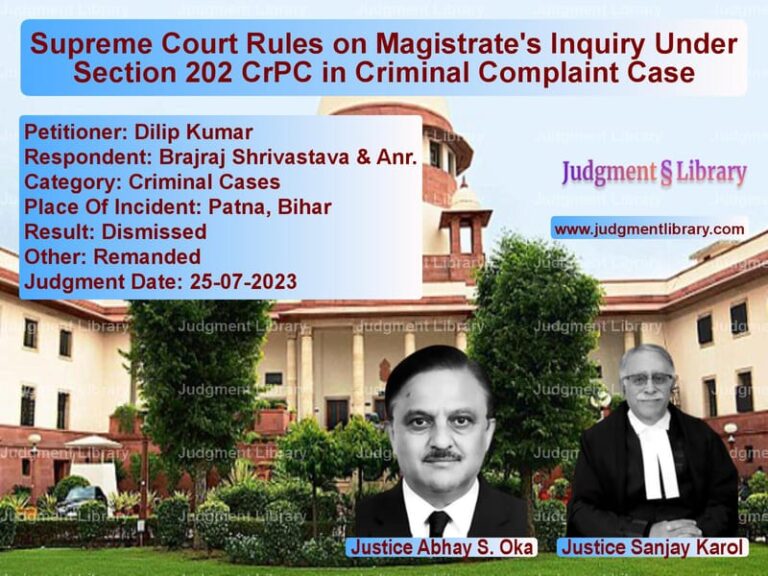Supreme Court Regularizes Admissions of MDS Students in Madhya Pradesh
The Supreme Court of India has ruled in favor of dental students in Irfan Akbani & Ors. vs. The State of Madhya Pradesh & Ors., providing relief to students whose Master of Dental Surgery (MDS) admissions were canceled due to procedural violations. The bench, comprising B.R. Gavai and K.V. Viswanathan, held that since similarly placed students had been allowed to complete their degrees, the appellants’ admissions should also be regularized to prevent wastage of their education.
Background of the Case
The appellants had completed their Bachelor of Dental Surgery (BDS) from Karnataka, Gujarat, and Maharashtra and later secured admission for the MDS course in dental colleges in Madhya Pradesh. However, their admissions were canceled by the Regulatory Authority on the following grounds:
- They had not participated in the required counseling process.
- The admissions were in violation of an order passed by the Supreme Court on March 17, 2016.
The cancellation was upheld by the Appellate Authority, prompting the students to approach the Madhya Pradesh High Court. Although the High Court initially granted an interim stay, allowing them to complete their MDS degrees from 2016 to 2019, the final judgment dismissed their petition, upholding the cancellation of admissions.
Legal Issues Considered
- Were the appellants’ admissions illegal due to their failure to participate in the counseling process?
- Did the authorities act arbitrarily by allowing similarly placed students to retain their admissions?
- Should the students be denied their degrees after successfully completing their courses?
- Does the principle of negative equality apply in this case?
Arguments by the Petitioners (Students)
The appellants, represented by Senior Advocate Kapil Sibal, argued:
- Their admissions had been granted by recognized dental colleges and were approved by the university.
- They had completed the MDS course and passed all required examinations.
- Similarly placed students, who had completed their BDS from Madhya Pradesh, were allowed to retain their MDS admissions, creating an unequal and discriminatory situation.
- The authorities had arbitrarily refused to regularize their admissions despite allowing others to continue.
Arguments by the Respondents (State of Madhya Pradesh and Regulatory Authorities)
The State of Madhya Pradesh and the regulatory bodies, represented by Senior Advocates Saurabh Mishra and Gaurav Sharma, countered:
- The appellants had gained admission through a backdoor entry without participating in the mandatory counseling process.
- The Supreme Court had earlier ruled against such admissions in its March 17, 2016 order.
- Regularizing their admissions would set a precedent allowing others to bypass mandatory admission rules.
- Unlike the appellants, the other students who were allowed to continue had fewer procedural violations.
Supreme Court’s Observations
On Discriminatory Treatment
The Court found that the approach adopted by the Regulatory Authority and the High Court was inconsistent. It noted:
“Similarly placed students who completed their BDS from Madhya Pradesh have been allowed to complete their MDS degrees. There is no rational justification for treating the appellants differently.”
Thus, the Court rejected the argument that the appellants’ case involved more violations than others, stating:
“Denying degrees to students merely because their case involves an additional irregularity compared to others who were allowed to continue is not a justifiable distinction.”
On Wastage of Education
The Supreme Court emphasized the public interest in preventing wastage of education, stating:
“The appellants have completed their MDS courses successfully. Given the shortage of specialists in dental sciences, denying them their degrees would serve no beneficial purpose.”
On the Principle of Negative Equality
While acknowledging that negative equality (i.e., granting relief based on an illegal precedent) does not typically apply under Article 226 of the Constitution, the Court held:
“In exceptional cases where similarly placed individuals have been treated differently without justification, the Court must intervene to ensure fairness.”
Final Verdict
The Supreme Court allowed the appeal, ruling:
- The orders of the High Court, Regulatory Authority, and Appellate Authority were set aside.
- The admissions of the appellants were to be regularized.
- The concerned authorities were directed to issue MDS degrees to the appellants.
- The judgment was based on the peculiar facts of the case and should not be treated as a precedent.
Impact of the Judgment
This ruling has significant implications for medical and dental education in India:
- Fairness in Admissions: Ensures that authorities cannot arbitrarily cancel admissions while allowing similarly placed students to continue.
- Prevention of Educational Wastage: Recognizes the importance of not denying degrees to students who have completed their courses.
- Checks on Regulatory Overreach: Reinforces judicial scrutiny over regulatory decisions that create unjustified discrimination.
The judgment upholds the principle that educational policies should be applied consistently, and arbitrary decisions should not harm students who have fulfilled academic requirements.
Petitioner Name: Irfan Akbani & Ors..Respondent Name: The State of Madhya Pradesh & Ors..Judgment By: Justice B.R. Gavai, Justice K.V. Viswanathan.Place Of Incident: Madhya Pradesh, India.Judgment Date: 04-12-2024.
Don’t miss out on the full details! Download the complete judgment in PDF format below and gain valuable insights instantly!
Download Judgment: irfan-akbani-&-ors.-vs-the-state-of-madhya-supreme-court-of-india-judgment-dated-04-12-2024.pdf
Directly Download Judgment: Directly download this Judgment
See all petitions in Fundamental Rights
See all petitions in Public Interest Litigation
See all petitions in Judgment by B R Gavai
See all petitions in Judgment by K.V. Viswanathan
See all petitions in allowed
See all petitions in Regularized
See all petitions in supreme court of India judgments December 2024
See all petitions in 2024 judgments
See all posts in Civil Cases Category
See all allowed petitions in Civil Cases Category
See all Dismissed petitions in Civil Cases Category
See all partially allowed petitions in Civil Cases Category







